An Interview with Robert Grillo: 10 Questions for the Founder of Free from Harm
Around Thanksgiving I came across the vegan website Free from Harm and began reading some of their articles.
I was amazed.
Every article I read on the site was shockingly well written, entertaining and interesting. I was like, what is this site??
I think Free from Harm is the best educational site for vegans who want to learn more about veganism and animal rights that I’ve ever seen. There are so many interesting articles, videos, reviews, debating points and comments on there. And somehow it is all written in a way that is enjoyable and fun to read.
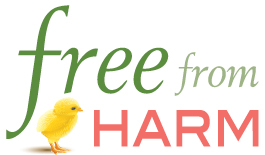
Well of course, I had to know what this site was all about and who was behind it. With a little google stalking I found that Free from Harm was run by one guy… Robert Grillo. He writes most of the articles himself in his free time. Wow. I began following him on Facebook and it became clearer that I had to ask if I could I interview this guy.
I find it amazing that one passionate, philosophical, deep and talented guy has created a website from his bedroom that millions are finding and learning from. Free from Harm is where people should go to learn about veganism. One truly can make a difference. I hope you enjoy the following interview.
10 Questions for Robert Grillo, Founder of Free From Harm
1. To start us off, could you say a little about yourself and Free From Harm in your own words (whatever comes to mind).
Rescue. Education. Advocacy. These are the three core activities for carrying out the FFH mission. We focus on chickens and turkeys to a very large extent because they represent such an enormous percentage of animals killed for food, some 99% in the U.S. I am Free from Harm’s founder and director. I am also editor of the website which consists of 700 plus pages now, and I write as much as time permits.
2. How did you first get interested in animal rights? Had you always been an animal lover?
No. I never considered myself an animal lover. In my 40s when I became aware of the massive scale of suffering that I had failed to see all my life, I felt as if I could strongly identify with the victims. And I recognized that an injustice of unimaginable and unprecedented proportions is being carried out every second of every day that is met with an almost equal proportion of collective cultural denial. It’s shocking to bear witness to and grasp this utter betrayal of farmed animals in our culture — shocking every minute of every day for me. I developed a great reverence and respect for all animals from this awakening, particularly those trapped in our food system by no choice of their own.
3. You are an excellent writer. Were you a writer before, and did writing the articles come naturally to you?
Yes, I’ve been a lover of writing and the humanities since I was a teenager. I love words and marvel at their power. I also love images and how images and language combine to deliver an even more powerful message. Writing the Free from Harm articles is my way of journaling my thoughts as they evolve over time. It’s like therapy for me. I’m most gratified by the writing I do when someone tells me that it helped them see or understand something better or helped empower their advocacy or life change in some way. I write to document my thoughts as much as I write for others in the hopes of sharing with them some tools and resources that could help them in their vegan or animal advocacy.
4. Do you have any stories that come to mind of people who have been changed by the info on free from harm? Do they ever write to thank you
Yes, I often get emails and messages on Facebook from people who express their gratitude. I also get a lot of inquiries from people that have either health concerns or socialization concerns about being vegan. I’m not qualified to answer the health concerns, so I refer them to sources I trust. In terms of social pressures, I have several articles on Free from Harm I can refer them to. These are typically people who need to build a support network to strengthen their resolve.
5. When did you decide to become a vegan, and in your opinion, was there one moment that made you, as I like to say, (inspired by the film The Ghosts in Our Machine) “see the ghosts” or in other words, understand on the deep level you do what veganism is all about, or was it a gradual process of deeper and deeper levels of understanding. (For me, when I saw slaughterhouse footage from Toronto Pig Save and forced myself to watch the whole thing, I feel I suddenly understood on a gut level what veganism was about and became passionate about it in a new way)
I think a light switch went off in my head after watching Food Inc in 2009. While I think the film and some of its figures, like Michael Pollan and Joe Salatin, overlook the most fundamental issues, I have to credit the film itself for being a powerful catalyst for me. After viewing it, I think I believed in the humane myth that the film presents as a solution, for about two days. What followed was a deeper exploration of the truth through hundreds of other books, websites, films, speakers, etc.

6. In your opinion, what do you think is the missing link that stops people from going vegan and “seeing the ghosts” or understanding that animals deserve freedom as much as we do. Do you have any thoughts on how to get through to people, or can people not be convinced and must they simply be ready in their own time and inspired by one’s example?
I don’t see it so much as a missing link as I do an internal conflict. On the one hand, we are by nature social animals who want to fit in. On the other, we are highly evolved moral beings with a strong sense of right and wrong. Our dominant culture supports a state of collective denial over the exploitation of animals. When the urge to fit in overrides our sense of right and wrong, we fall victim to that denial, inventing reasons and defending that which we know deep down is wrong. I believe the solution is to challenge, in constructive ways, our culture’s deeply entrenched beliefs on both a grassroots as well as on an institutional level. Institutional change is necessary to bring about the paradigm shift we are looking for. We must challenge speciesism and carnism with key stakeholders and decision makers, particularly in the media, who control the public’s access to information. That’s one reason why I spend time and energy communicating with the major media outlets, particularly when they publish articles or segments on the subject.
7. Do you have any thoughts by chance on where you think your passion for helping animals comes from?
It’s a good question and hard one to answer for me. As I said earlier, we place an incredibly disproportionate value on language — on the power of words and information and the power to communicate. Animals don’t speak our language so they are perceived as not having any language at all, or ability to communicate. They are powerless without our words. This excludes them from acceptance into our moral community. I’m using my skills as a writer and branding/marketing consultant to speak, write and visualize on their behalf. In the end, I believe it is the injustices I see, that are based on gross misrepresentations of animals, that fuel my passion for what I do.
8. I picked up from following you on Facebook that you sometimes take injured animals into your home and rehabilitate them. Do you care for many animals in your free time?
I play the main role in the rescues that Free from Harm organizes. We are growing our network of small, local sanctuaries and other rescue organizations and individuals. In 2013, We rescued and rehomed six chickens. Each rescue is provided with the best medical care and rehabilitation. We make the most of each rescue by documenting their stories in articles, images and video coverage. We believe that connecting people to these individuals in an intimate way is an effective form of advocacy.
9. Do you have any animal rights or personal heroes, and if so, who are they? Secondly, can you give us your top 5 educational animal rights related books, documentaries, articles, or interviews etc that you think everyone should read?
Yes. Those I admire are also the authors of the same books I’d recommend. These are just a handful that come to mind (and no where near a comprehensive list).

.jpg)
10. What do you think the future of veganism and animal rights is. I’d be very curious to hear your predictions for the future.
I believe our future depends much on what we can learn and apply from the successes of past and contemporary social justice movements and the extent to which we can demonstrate how we all share a common cause.
Scientists at Rensselaer Polytechnic Institute have found that when just 10 percent of the population holds an unshakable belief, their belief will always be adopted by the majority of the society. The scientists, who are members of the Social Cognitive Networks Academic Research Center (SCNARC) at Rensselaer, used computational and analytical methods to discover the tipping point where a minority belief becomes the majority opinion. The finding has implications for the study and influence of societal interactions ranging from the spread of innovations to the movement of political ideals.
“When the number of committed opinion holders is below 10 percent, there is no visible progress in the spread of ideas. It would literally take the amount of time comparable to the age of the universe for this size group to reach the majority,” said SCNARC Director Boleslaw Szymanski, the Claire and Roland Schmitt Distinguished Professor at Rensselaer. “Once that number grows above 10 percent, the idea spreads like flame.”
Simon Sinek makes a really compelling case for how this process works and the key attributes of successful leaders/advocates in his TED Talk which you can watch here.

Simon Sinek (TED)
With the right combination of advocacy efforts mentioned earlier and at least a “perceived” mobilization of our movement, we can and will achieve the 10–15% and beyond.
————
Thank you, Robert.
Victoria here. One additional note. Free From Harm wants to hire this rockstar social media genius and amazing writer Ashley Capps who has driven a million people to the site in the last six months. The articles she has guest written have been consistently the most popular articles on the site. She also authors the hugely popular Facebook page Compassion is Consistent, which has almost 18,000 fans. She wants to work full time for Free From Harm next year and a donor has agreed to match any donations to Free From Harm which will go towards paying her salary next year.

Amazing much? She has the marketing golden touch that will get Free From Harm, which deserves to be read by all, out there on the web. They need to hire her. (One can donate here)

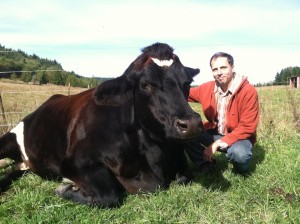
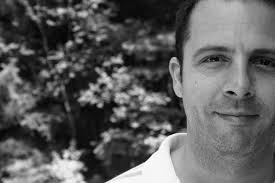
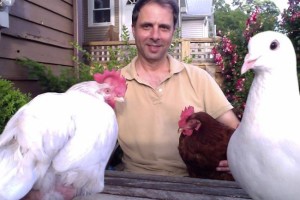
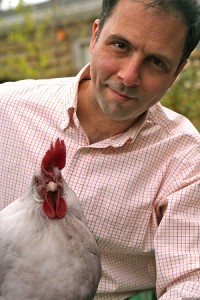
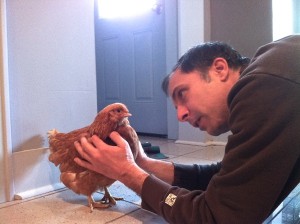








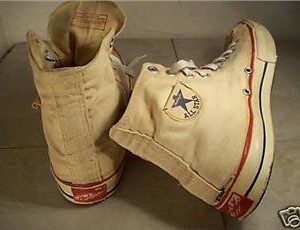
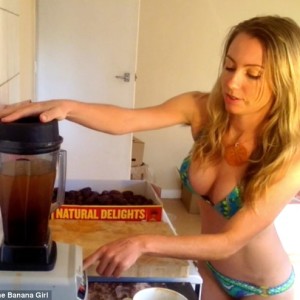
I am a recent vegan and cannot believe that I didnt follow my heart years ago. I am ashamed of myself and more that I have raised a meat eating son. I cannot go back but I am going to make damn sure I spread the word from now on. Peace and love to the beauteous animals who must be avenged and saved from this Holocaust and hell on earth. Jo xxx
Wow Jo! That is so inspiring! Thank you for this comment. Don’t be too hard on yourself as we are almost all coming to veganism later in life. Can I ask you, how did you come to be vegan?